XRT Response Functions: effect of new atomic data (Chianti ver. 9.0,
released Mar-2019).
(1-Nov-2019, by Aki Takeda)
(15-Dec-2019, by AkT, added plots)
(6-Apr-2020, AkT, recalculated using the most recent isothermal.pro,
ver.15, 1-Apr-2020)
(30-Oct-2020, AkT, added tck-Be/med-Be ratio plots.
The XRT temperature response functions were recalculated, in response to
the release of new Chianti atomic database version 9.0.1 in March-2019.
The new atomic database (Chianti 9.0.1) turned out to make only
negligible change on the XRT response functions calclated with the
previous versions of Chianti(ver. 8.0.0).
However, the filter ratio curves with the thick_Be filter (tck_Be/tck_Al,
tck_Be/med_Al, etc.) yeild 20-50% higher temperatures than the results
with Chianti ver. 8.0.0 at the temperature range around logT=7.0.
quick review on the XRT temperature response basics.
1. The Response functions.
The solar spectra were calculated with the latest Chianti version 9.0,
for 'coronal' (sun_coronal_1992_feldman_ext.abund),
'hybrid' (sun_coronal_2012_schmelz_ext.abund), and
'photospheric' (sun_photospheric_2015_scott.abund) abundances.
- (a) solspec_ch901_corona_chianti.genx
- (b) solspec_ch901_cr2012schmelz2_chianti.genx
- (c) solspec_ch901_ph2015scott_chianti.genx
Below are the previous versions for comparison.
- (d) solspec_ch800_corona_chianti.genx
- (e) solspec_ch800_cr2012schmelz2_chianti.genx
- (f) solspec_ch800_ph2011caffau_chianti.genx
Then I modified XRT_FLUX.PRO so that it can access the above spectrum files
by setting the corresponding keyword. Examples of usage are as follows
(including older versions).
IDL> flux_c = xrt_flux0901(logte, f1,f2, tim, /corona)
IDL> flux_h = xrt_flux0901(logte, f1,f2, tim, /hybrid)
IDL> flux_p = xrt_flux0901(logte, f1,f2, tim, /photos)
IDL> flux_c8 = xrt_flux800(logte, f1,f2, tim, /corona)
IDL> flux_h8 = xrt_flux800(logte, f1,f2, tim, /hybrid)
IDL> flux_p8 = xrt_flux800(logte, f1,f2, tim, /photos)
[ Example of calculating XRT response functions ]
For details, see the description of
Mithra:/www/HINODE/XRT/xrt_ssw/xrt_flux901.pro.
IDL> tim='1-may-2017 00:00' ; change as needed.
IDL> f1=0 & f2=2 ; for Open/Ti-poly
IDL> logte = 5.+findgen(61)*0.05 ; prepare a temperature array
IDL> flux = xrt_flux901(logte, f1,f2, tim, /corona)
Below are the response functions of all the X-ray analysis filters available
at XRT. It is known that the contamination accumulated on the CCD modifies
the XRT response functions. As the amount of contamination varies with time,
response functions are time-dependant. For the later convenience of analysis,
the following response functions were calculated for the contamination level
as of 12-Nov-2006.
(Click each plot to show details)
| Al-poly/Open | thin-Be/Open |
med-Be/Open | med-Al/Open |
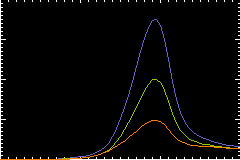 |
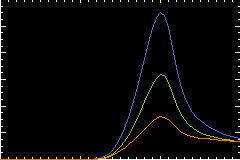 |
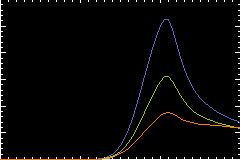 |
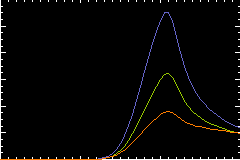 |
| Open/Al-mesh | Open/thick-Al |
Open/thick-Be | Al-poly/Ti-poly |
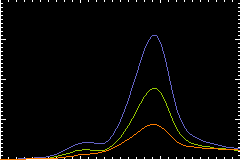 |
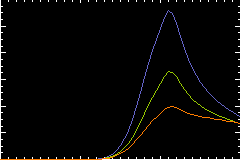 |
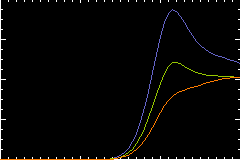 |
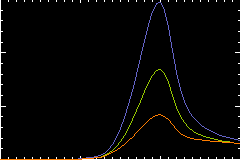 |
| Open/Ti-poly |
C-poly/Open |
|
|
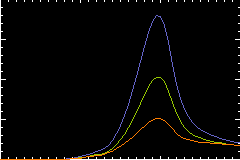 |
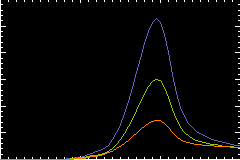 |
|
|
2. The Filter Ratios.
These plots shows that the CHIANTI ver 9.0.1 database makes no significant
difference in most filter ratio curves relative to those with version 8.0.0,
except the ratios with thick_Be filters (e.g., thick-Be/med-Al,
thick-Be/thick-Al), for which, derived temperatures are 20-50% higher
than the previous version at the temperature range logT is ~7.0.
(click each plot to show detailed info)
| Al-poly/Al-mesh | thin-Be/Al-mesh |
thin-Be/Al-poly | med-Be/Al-poly |
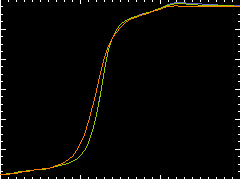 |
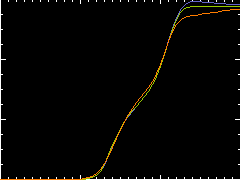 |
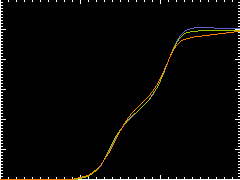 |
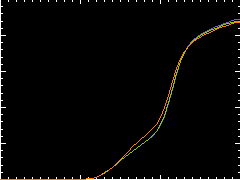 |
| med-Al/Al-poly | med-Be/thin-Be |
med-Al/thin-Be | med-Al/med-Be |
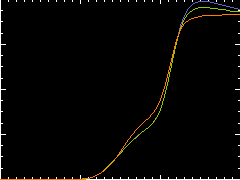 |
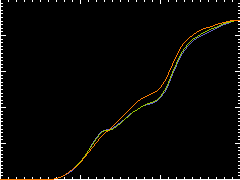 |
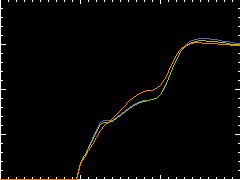 |
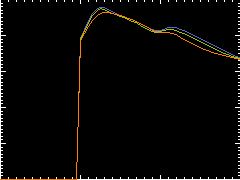 |
| thick-Be/med-Al | thick-Be/thick-Al | Ti-poly/Al-mesh |
thick-Be/med-Be |
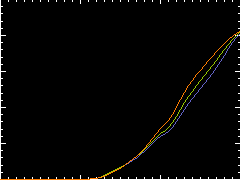 |
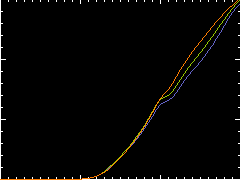 |
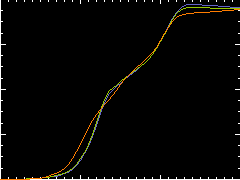 |
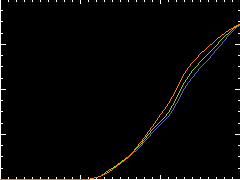 |
3. XRT_TEEM modification.
XRT_TEEM_CH901.PRO was prepared.
Instead of directly modifying XRT_TEEM, I made a wrapper procedure
that sets up the arrays of specified solar spectrum, and passes them
to XRT_TEEM. You can get it from
Mithra:/www/HINODE/XRT/xrt_ssw (or Ylstone:/disk/yla/software/xrt_ssw).
- [Note 1] : Be sure to run with the latest version of XRT_TEEM
and XRT_FLUX (both v2013-Nov-04), that includes new filter
calibration (with CAL keyword). The version modified by Takeda in 2011
does not support this recalibration.
- [Note 2] : If you download this procedure, do it together with the
solar spectrum files listed in the above ('solspec_ch800_corona_chianti.genx'
is required at least). They are also found in the same directory.
- [Note 3] : You might need to edit/change the path of the solar spectrum
file directory(DIR_SPEC). They should eventuraly be sent to $SSW_XRT,
but for now they are stored in
/disk/yla/software/xrt_ssw/solar_spectrum, that is the current setting
of DIR_SPEC defined at the begining of the procedure.
IDL> XRT_TEEM_CH901, index1,data1,index2,data2,te,em, /corona
IDL> XRT_TEEM_CH901, index1,data1,index2,data2,te,em, /hybrid
IDL> XRT_TEEM_CH901, index1,data1,index2,data2,te,em, /photospheric
IDL> XRT_TEEM_CH901, index1,data1,index2,data2,te,em, solar_spectrum='./solar_spectrum/solspec_ch901_ph2015scott_chianti.genx'
4. Newly introduced abundances.
A new photosperic abundance set is introduced since the recent version.
For comparison, I calculated the following two sets.
The comparison plots of the response functions with new and old
hybrid abundances for the 5 filters as samples.
- 'sun_photospheric_2015_scott.abund'
(solspec_ch901_ph2015scatt_chianti.genx)































